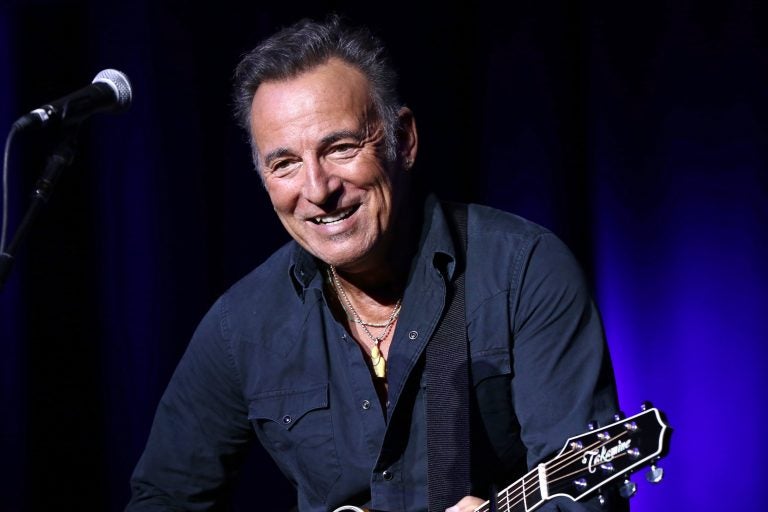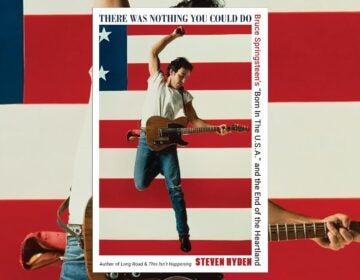Speaking from the depths, Springsteen’s ‘Nebraska’ continues to inspire
A new special about Bruce Springsteen's 1982 album “Nebraska” debuts Aug. 31 on WHYY. Host Matt Guilhem discusses the album’s legacy with music biographer Warren Zanes.
Listen 8:19
File photo: In this Nov. 10, 2015 file photo, Bruce Springsteen performs at the 9th Annual Stand Up For Heroes event in New York. (Photo by Greg Allen/Invision/AP, File)
For more than half a century, Bruce Springsteen has been turning out hits that have become part of the nation’s fabric. Whether it’s a soaring anthem or a tale of bending the law, Springsteen’s vast and varied catalog has inspired legions of fans and generations of musicians.
“Nebraska” was one album that took a while to leap out of The Boss’ lineup. Recorded in 1982 by Springsteen in his bedroom on a four-track cassette, the stripped-down record tells the stories of fugitives and everyday people at a crossroads in their lives. The album was reasonably successful when it came out, but over the decades, its reputation has risen and it’s now seen as one of Springsteen’s most influential works.
A new special about the album debuts on WHYY on Saturday, Aug. 31. WHYY host Matt Guilhem sat down with musician and music biographer Warren Zanes (“Deliver Me From Nowhere: The Making of Bruce Springsteen’s ‘Nebraska.’”), who has a leading role in the special’s production.
Editor’s note: The following interview transcription has been edited for clarity.
Guilhem: Hi, Warren.
Zanes: Nice to be here. Thank you for having me.
Guilhem: Now, you said you wrote the book on “Nebraska” because it was your go-to music when you were at a crossroads or in trouble. What is it about the album that’s kept you, and I assume keeps you, coming back to it?
Zanes: The stories in “Nebraska” are stories of people facing a kind of trouble that I identified with. When I was younger, I didn’t know exactly why I was identifying with it. But Springsteen’s music often had a kind of redemption to it. And then “Nebraska” came and the redemption was gone. And I knew why I connected with “Thunder Road,” with “Born to Run,” with “Rosalita.” But suddenly there were these dark stories of people really coming unmoored and my connection was just as strong. So I kept going back to “Nebraska” to find out what part of me was really hearing the voices and the songs of “Nebraska.” So writing about it was like any book — say it involves some self-exploration.
Guilhem: So something about the darkness drew you in and had an allure. I’m wondering, was there a standout track on there?
Zanes: It changes, but “My Father’s House,” which was the last song that Bruce recorded for “Nebraska.” It’s about a connection between a father and a son that will never be fixed, and I connected with that. My father is somebody that I met fewer than 10 times. He’s somebody that I didn’t know. And to have an artist, who I already admired, give me a song that helped me process my own experience well, that was meaningful. “Highway Patrolmen,” there is another song. It’s about brothers, and I’ve got one of those. And that relationship is, it’s been joyful and it’s been really challenging. That song, I felt like I learned something about the storms that could come between me and my sibling. The amazing thing, I talked to Dave Alvin from the Blasters about this because he was also in a band with his brother, just like I was.
Guilhem: You’re in the Del Fuegos.
Zanes: Yeah. Bruce is writing this song and really getting to the heart of the brother experience, yet he doesn’t have one. The wonder to us was how could he possibly write this song without having a brother — to know what he knew? Because we were learning something from a guy who hadn’t even had our experience directly.
Guilhem: The title of your book, it’s a lyric that appears in the songs, “Open All Night” and “State Trooper.” I’m curious, what about the phrase “deliver me from nowhere” grabbed you? It’s a great construction of words.
Zanes: I love the fact that it appears in two songs because that tells us he’s not finished and he wasn’t finished. This is an imperfect record — it’s unfinished. It wasn’t prepared for the commercial marketplace in the way his other material had been, he released demos. It’s the only official release he put out not knowing it was going to be an official release. There’s that, that his intention wasn’t to make a record when he was making it. So we get to see a part of him as an artist that we wouldn’t otherwise.
But that phrase “deliver me from nowhere,” I feel like it’s someone speaking from the depths, total emptiness. I can remember the times in my own life when I got to the place of total emptiness and two things can happen. One is a big part of you dies, or you finally ask for help. To say “deliver me from nowhere,” depending on your tradition, it’s like a call to whatever your God is. It’s the last glimmer before total hopelessness.
“Deliver me from nowhere,” you know, when people write songs from that place, they’re the songs I’m looking for on the album. And usually, it’s one song, if there’s even one. But here is a whole album of them somehow intuitively as a teenager. I knew there was something in it for me, but it was over decades of coming back to it when I had troubles in my own life that I found out more and more about the album and I found out more and more about myself.
Guilhem: The album, when it came out, was really a lot of unknowns for Springsteen. It was this release of demos, essentially, not a polished final product. So when it did come out in 1982, what was the response initially? And then when did fans, musicians and critics really start to re-evaluate it?
Zanes: Well, so in the Rolling Stone review, when it came out in ‘82, they described it as a “shock.” In the San Francisco Chronicle, the writer said it was a surprise that he would release this at all. These were positive reviews nonetheless describing it as a kind of unthinkable act from a major pop star, which indeed it was. So the initial response was surprise, and usually when you have a moment like that, the artist will go out and do interviews to explain why they made such an unconventional move. But Springsteen refused to do interviews, he refused to tour behind it. He refused to even put his picture on the cover of the album. So his commitment to this recording was to let it, the recording itself, be the only voice explaining what it was.
Guilhem: What do you think caused it to sort of bubble up in the Springsteen canon, and this is not some strange outlier [that this was] a seminal part of his musical development?
Zanes: He was known as one of the greatest entertainers out there. Bruce Springsteen went out and it looked more like James Brown. I mean, it was a show, but the show was so good that people started to not forget what a great songwriter he was. To think less about it, “Nebraska” comes along and it’s not about the show, it’s not about the band. It’s all about that songwriter. I think the musician community, and the fan community, through “Nebraska,” came back to Bruce as a songwriter. Full stop.
Guilhem: Well, it has come through a lot, and it is now about really to have a moment. Your book is being turned into a film, and this week, WHYY is premiering Bruce Springsteen’s “Nebraska: Celebration in Words and Music.” You’re involved in that, you provide the words, but the music is also a big part of the special. It was filmed in Nashville. Tell us a bit about this sort of celebration of “Nebraska.”
Zanes: The night was a part of the Americana Music Association’s annual conference, which was perfect timing and it made that organization, the perfect collaborator. So a lot of people were in town and the thing I already knew is what Springsteen, you know, the degree to which he matters to that community and the degree to which “Nebraska” in particular matters. So we just started putting out feelers and it ended up being a situation where it wasn’t that we were not getting “yesses” to being involved. It’s that we were having to turn people down.
It told us very quickly that we were doing the right thing and we were going to be able to sculpt an evening. I drove away the day after in my station wagon with my dog Toby because I was going to teach at Colorado College. And, I thought this was the biggest night of my career because I got to tell a story about American music that I wanted to tell, the “Nebraska” story. And I had musical support from Emmy Lou Harris, Lyle Lovett, Noah Khan, the Lumineers. It was an unthinkable cast. But what got them? It was this record.
Guilhem: When you were there speaking to these artists, did they share stories and have a similar sort of growing up as a listener with the album?
Zanes: I immediately, it was almost like, you know, when you, there’s a memorial and people start telling stories about the deceased. In this case, it wasn’t the deceased. It was this recording and people didn’t even need to be asked. It was just, that this was the place you came to say why that record meant something to you. Then in driving down the day before, again in the car with my dog Toby. I got a call from an undisclosed number and it was Bruce. Bruce wanted to know who was doing what song and we talked about what was gonna happen. And I don’t get calls from Bruce Springsteen. I mean, it’s not a regular occurrence.
Guilhem: He’s not on speed dial.
Zanes: He is not on speed dial. But there he was, he just wanted to know who was doing what song, what they picked. And then I was sitting with a friend the day after … before I started driving to Colorado, he called again and wanted to know how it went down. This is his connection to “Nebraska.” He wanted to see what our connections to the recording did because of his connection to it. So I feel like everybody was in this circle, and it included Bruce Springsteen standing around this recording that still for everyone involved has a lot of mystery.
You can see him in “Bruce Springsteen’s ‘Nebraska,’ a Celebration in Words and Music” on WHYY Saturday, Aug. 31.

Saturdays just got more interesting.
WHYY is your source for fact-based, in-depth journalism and information. As a nonprofit organization, we rely on financial support from readers like you. Please give today.




